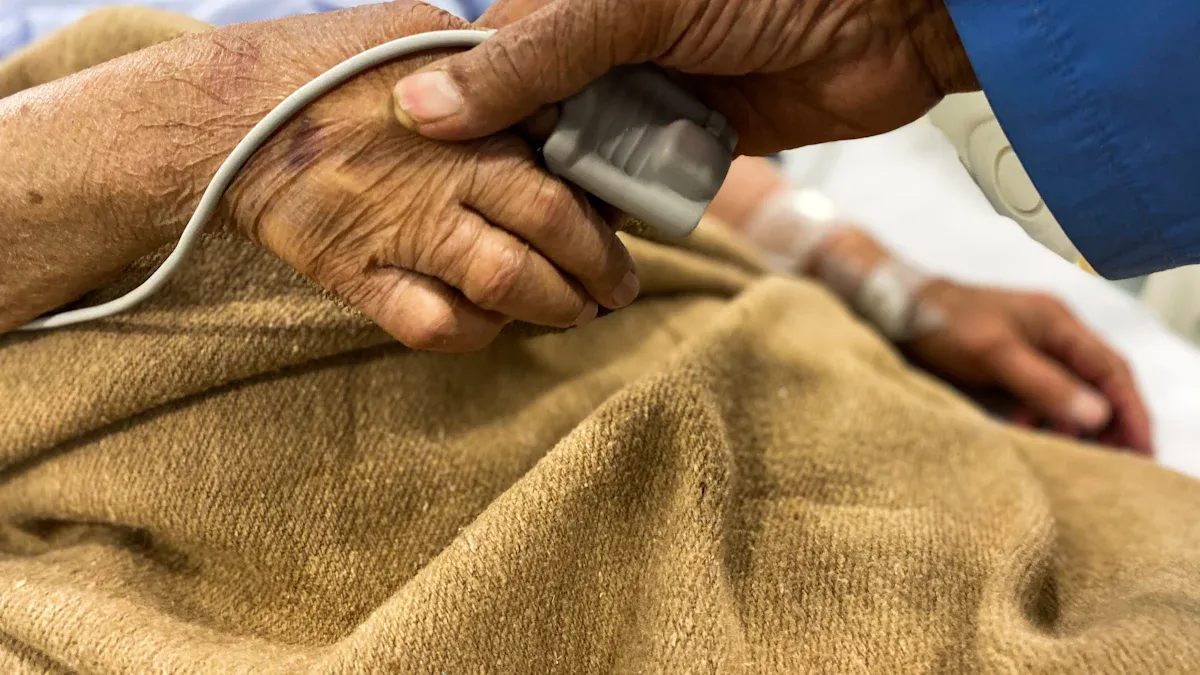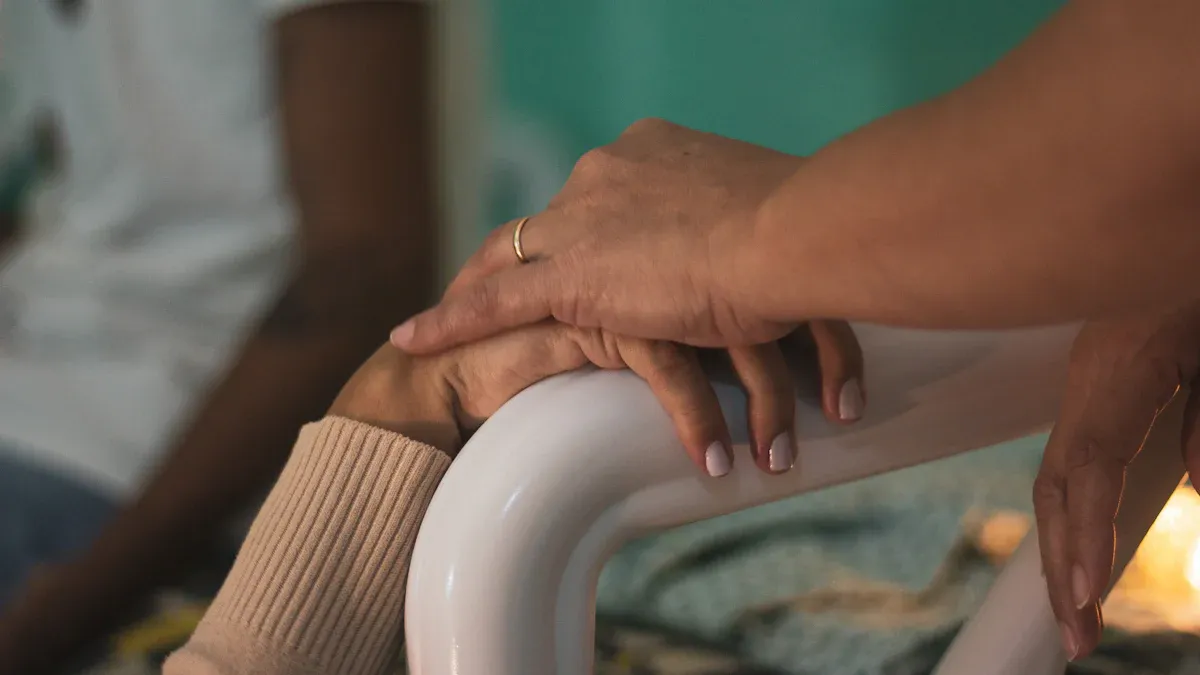How Doctors Communicate a Cancer Diagnosis with Empathy

Hearing the words "you have cancer" can feel like the ground has shifted beneath you. For many patients and their families, this moment brings a whirlwind of emotions—fear, grief, and uncertainty. Studies show that cancer survivors often face challenges like depression and anxiety, while some even experience shifts in self-perception or relationships. Younger patients, in particular, struggle with emotional needs that existing services often fail to meet.
This is where empathetic communication becomes crucial. When doctors approach these conversations with care and understanding, they create a space where trust can grow. Research highlights that patient-centered communication not only improves trust but also enhances satisfaction with care. By balancing honesty with compassion, doctors can help patients feel supported, even when breaking the news: how doctors communicate a cancer diagnosis can shape the entire journey ahead.
Key Takeaways
Talking with care builds trust. Doctors should be truthful but kind when sharing a cancer diagnosis to help patients feel cared for.
Simple words ease worry. Avoiding hard medical terms and using easy words helps patients understand better and ask questions.
Being honest but hopeful is important. Doctors should explain how serious cancer is but also talk about treatments to keep patients positive.
Listening closely shows you care. Doctors should notice body language and change how they talk to match patients' feelings.
A safe space helps. Giving privacy and allowing open talks lets patients share their thoughts and worries easily.
Breaking the News: How Doctors Communicate a Cancer Diagnosis

Establishing Trust and Transparency
The role of honesty in building trust.
When you hear difficult news, honesty matters. Doctors know that being truthful about a cancer diagnosis is the foundation of trust. Patients often feel overwhelmed, and clear, honest communication helps them process the information. Research shows that patient-centered communication builds confidence in doctors and improves satisfaction with care. By being upfront, doctors create a sense of security, which is essential for you to feel supported during such a challenging time.
Honesty doesn’t mean being harsh. It’s about delivering the truth in a way that respects your emotions. Studies highlight that effective communication, paired with empathy, directly impacts your emotional well-being. This approach helps you cope better with the diagnosis and trust your doctor’s guidance.
Using clear language to reduce patient anxiety.
Medical jargon can make an already stressful situation worse. Imagine hearing a string of unfamiliar terms when you’re trying to understand your diagnosis. Doctors aim to simplify complex information, using clear and straightforward language. This reduces anxiety and ensures you fully grasp what’s happening. Communication models like SPIKES and PEWTER guide doctors in breaking down medical details while addressing your emotional needs.
When doctors explain things clearly, it’s easier for you to ask questions and make informed decisions. This transparency fosters a collaborative relationship, where you feel like an active participant in your care.
Balancing Honesty with Hope
Delivering the diagnosis while maintaining optimism.
Hearing the words “you have cancer” is life-changing, but it doesn’t have to feel like the end. Doctors strive to balance honesty with hope, ensuring you understand the seriousness of the situation while highlighting the possibilities ahead. Studies emphasize that maintaining hope is crucial for cancer patients. It can positively influence your emotional state and even your treatment outcomes.
Doctors often mention treatment options or advancements in care to reassure you. This approach helps you focus on what’s possible rather than just the challenges. By blending honesty with optimism, they aim to keep you motivated and engaged in your journey.
Choosing supportive and realistic language.
The words doctors choose matter. Supportive and realistic language can make a world of difference in how you perceive your diagnosis. For example, instead of saying, “There’s nothing we can do,” a doctor might say, “Here’s what we can focus on to improve your quality of life.” This subtle shift in phrasing helps you feel more hopeful and less defeated.
Research highlights that patients value emotional support during bad news delivery. Doctors who actively listen and tailor their communication to your needs can significantly reduce your distress. By being transparent yet compassionate, they ensure you feel heard and understood.
The Role of Empathy and Sensitivity in Delivering a Diagnosis

Understanding the Patient’s Perspective
Recognizing emotional and non-verbal cues.
When you’re receiving life-changing news, your emotions often speak louder than words. Doctors trained in empathetic communication pay close attention to your body language, facial expressions, and tone of voice. These non-verbal cues help them understand how you’re feeling, even if you don’t say it outright. For example, a furrowed brow or a trembling voice might signal fear or confusion. Recognizing these signs allows doctors to adjust their approach, ensuring you feel supported.
Research shows that understanding your perspective can improve trust and emotional well-being. Patients who feel heard and understood are more likely to trust their doctors and feel empowered in their care decisions. This connection is especially important when breaking the news about a cancer diagnosis.
Adapting communication to the patient’s emotional state.
Your emotional state can change rapidly during a difficult conversation. A good doctor knows how to adapt their communication style to meet you where you are emotionally. If you’re feeling overwhelmed, they might slow down and give you time to process. If you seem ready to ask questions, they’ll provide clear and honest answers. This flexibility helps you feel more in control during a challenging moment.
Strategies for Empathetic Communication
Practicing active listening to validate emotions.
Active listening is more than just hearing words—it’s about truly understanding what you’re saying and feeling. When doctors practice active listening, they focus entirely on you. They might nod, maintain eye contact, or repeat back what you’ve said to show they’re engaged. This approach validates your emotions and reassures you that your feelings matter.
Avoiding distressing language and offering reassurance.
The words a doctor uses can shape how you perceive your diagnosis. Avoiding harsh or overly clinical language can make the conversation less intimidating. For instance, instead of saying, “This is a terminal condition,” a doctor might say, “We’ll focus on treatments to improve your quality of life.” This shift in language offers reassurance while still being honest. Studies highlight that compassionate communication reduces feelings of isolation and anxiety, helping you feel more supported.
Creating a Supportive Environment
Ensuring privacy and uninterrupted time for discussions.
Privacy matters when discussing sensitive topics like a cancer diagnosis. Doctors often choose quiet, private spaces for these conversations, free from interruptions. This setting allows you to express your emotions openly without fear of judgment. It also gives you the time and space to ask questions and process the information.
Encouraging open dialogue and addressing patient concerns.
A supportive environment isn’t just about the physical space—it’s also about the tone of the conversation. Doctors encourage open dialogue by inviting you to share your thoughts and concerns. They might ask, “What’s on your mind?” or “Do you have any questions about what we’ve discussed?” This approach fosters trust and ensures that your needs are at the center of the conversation.
Empathetic communication, combined with a supportive environment, can transform how you experience a cancer diagnosis. Open discussions reduce anxiety and help you feel less isolated. By focusing on your emotional needs, doctors can make this difficult moment a little easier to bear.
Challenges Doctors Face in Delivering a Cancer Diagnosis
Emotional and Psychological Barriers
Managing personal discomfort with delivering bad news.
Delivering a cancer diagnosis isn’t easy for doctors. You might think they’re used to it, but many struggle with the emotional toll. Stress and discomfort often arise when they have to share life-changing news. This emotional burden can make it harder for them to communicate effectively. Studies show that doctors who feel overwhelmed may unintentionally distance themselves, which can leave you feeling unsupported.
Cultural differences can also add complexity. For example, in some cultures, patients prefer indirect communication, while others value complete transparency. Doctors must navigate these nuances to ensure you feel respected and understood.
Balancing professionalism with emotional connection.
Doctors walk a fine line between staying professional and showing empathy. You might notice that some doctors seem reserved, while others are more open. This balance is tricky because they want to connect with you emotionally without losing their objectivity. Research highlights that trust in your doctor grows when they communicate with warmth and understanding. It’s a delicate act, but one that can make a big difference in how you process the diagnosis.
Simplifying Complex Medical Information
Avoiding medical jargon to enhance understanding.
Medical terms can feel like a foreign language. Imagine hearing words like “metastasis” or “prognosis” without any explanation. Doctors aim to simplify these terms so you can fully understand your situation. Clear communication helps reduce confusion and anxiety, making it easier for you to ask questions and make decisions.
Addressing misconceptions and fears with clarity.
You might have fears or misconceptions about cancer, like assuming it’s always fatal. Doctors work to address these concerns with accurate information. They explain treatment options and outcomes in a way that reassures you while staying realistic. This clarity helps you feel more in control of your journey.
Systemic Pressures and Time Constraints
Balancing empathy with a busy schedule.
Doctors often face tight schedules, which can limit the time they spend with you. Despite this, many strive to create meaningful conversations. They know that even a few extra minutes of empathetic listening can make you feel valued and heard.
Collaborating with multidisciplinary teams for support.
You’re not alone in your care. Doctors often work with a team of specialists, including counselors and patient advocates, to provide comprehensive support. This collaboration ensures you receive both medical expertise and emotional care.
Challenge/Recommendation | Description |
|---|---|
Physicians often lack the necessary skills to effectively communicate a cancer diagnosis. | |
Negative emotions experienced by physicians | Doctors may experience stress and emotional burden when delivering bad news. |
Cultural differences | Variations in cultural backgrounds can affect communication strategies and patient understanding. |
Importance of emotional support | Patients prefer emotional support from physicians during the diagnosis process. |
Need for comprehensive disclosure | Patients desire full transparency regarding their diagnosis to maintain hope. |
Influence of treatment plan disclosure | The manner in which treatment options are presented can impact patient hope and stress levels. |
Doctors face many challenges, but their commitment to improving communication can make all the difference in your experience.
Actionable Tips for Improving Communication Skills
Training and Development
Participating in communication workshops and role-playing.
Improving how you communicate starts with practice. Workshops and role-playing exercises give doctors a safe space to refine their skills. These sessions often simulate real-life scenarios, helping doctors learn how to deliver difficult news with empathy. For example, a study by Fujimori et al. (2014) found that training programs tailored to patient preferences significantly improved communication during bad news disclosures. Another study by Fukui et al. (2008) showed that such training reduced patients' psychological distress after a cancer diagnosis.
Study Title | Authors | Year | Findings |
|---|---|---|---|
Effect of communication skills training program for oncologists based on patient preferences for communication when receiving bad news: a randomized controlled trial | Fujimori M, Shirai Y, Asai M, et al. | 2014 | Training tailored to patient preferences improved communication during bad news disclosures. |
A randomized study assessing the efficacy of communication skill training on patients' psychologic distress and coping: nurses' communication with patients just after being diagnosed with cancer | Fukui S, Ogawa K, Ohtsuka M, et al. | 2008 | Communication skills training reduced patients' psychological distress. |
Seeking constructive feedback from peers and mentors.
Feedback is a powerful tool for growth. By asking peers or mentors for input, doctors can identify areas for improvement. Constructive feedback helps refine communication techniques, ensuring that patients feel heard and supported. Clinical supervision, as highlighted by Heaven et al. (2006), plays a key role in transferring skills learned in workshops to real-world settings.
Enhancing Emotional Intelligence
Practicing self-awareness and empathy in daily interactions.
Empathy isn’t just about understanding others—it starts with understanding yourself. Practicing self-awareness helps you recognize your emotions and how they influence your interactions. When you’re more in tune with your feelings, it’s easier to connect with patients on a deeper level. Simple acts like maintaining eye contact or acknowledging a patient’s concerns can make a big difference.
Managing stress to maintain emotional resilience.
Stress can cloud your ability to communicate effectively. Managing it is essential for staying present and empathetic. Techniques like mindfulness or regular exercise can help you maintain emotional resilience. When you’re calm and focused, you’re better equipped to support patients during tough conversations.
Utilizing Resources and Support
Collaborating with patient advocates and counselors.
You don’t have to do it all alone. Patient advocates and counselors can provide additional support, helping patients process their emotions and concerns. This collaboration ensures that patients receive both medical and emotional care. Tailored communication strategies, as noted in research, enhance trust and satisfaction during these encounters.
Following communication guidelines from professional organizations.
Professional organizations offer valuable resources to improve communication. Guidelines often include best practices for delivering bad news and addressing patient concerns. By following these recommendations, you can ensure your approach aligns with proven strategies. Open discussions, as research suggests, reduce patient anxiety and foster trust.
Tip: Small changes, like simplifying medical terms or pausing to listen, can transform how patients experience a diagnosis. Start with one strategy and build from there.
Empathetic communication plays a vital role in delivering a cancer diagnosis. When doctors actively listen and address your concerns, it builds trust and improves your overall experience. Research shows that patient-centered communication not only enhances satisfaction but can also positively impact health outcomes. By fostering respect and understanding, doctors help you feel supported during a challenging time.
Note: Continuous learning and skill-building are essential for doctors. Workshops, feedback, and emotional intelligence training ensure they stay equipped to provide compassionate care. These efforts make a real difference in shaping your journey toward healing.
FAQ
What should I do if I don’t understand my diagnosis?
Ask your doctor to explain it again in simpler terms. Don’t hesitate to request clarification or examples. You can also bring a trusted friend or family member to help you process the information and ask additional questions.
Tip: Writing down your questions beforehand can help you stay focused during the conversation.
How can I prepare for a conversation about my treatment options?
Take notes on your symptoms and concerns before the appointment. Research basic terms related to your condition, but avoid overwhelming yourself with too much information. Bring a notebook to jot down key points during the discussion.
Note: It’s okay to ask for time to think about your options before making decisions.
What if I feel too emotional to ask questions?
It’s normal to feel overwhelmed. Let your doctor know how you’re feeling. They can pause the conversation or revisit it later. You can also ask a loved one to attend the appointment and help you ask questions.
Reminder: Your emotions are valid, and doctors are trained to support you through this.
Can I ask for a second opinion?
Absolutely. Seeking a second opinion is common and can give you more confidence in your diagnosis and treatment plan. Most doctors encourage it and can even recommend another specialist for you.
Tip: Bring all your medical records to the second opinion appointment for a smoother process.
How do I talk to my family about my diagnosis?
Start by sharing only what you feel comfortable discussing. Use simple language and be honest about your feelings. Encourage them to ask questions and express their emotions too. This can help create a supportive environment for everyone.
Advice: Consider involving a counselor or support group if the conversation feels too difficult.
See Also
Exploring Choroid Plexus Carcinoma: Symptoms And Treatment Options
Recognizing Duodenal Cancer: Key Symptoms And Treatment Insights
An In-Depth Overview Of Various Cancer Types Available
Identifying Conjunctival Melanoma: Symptoms And Treatment Approaches

